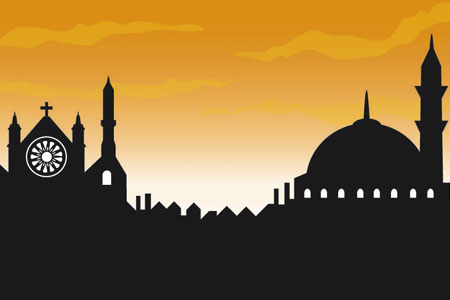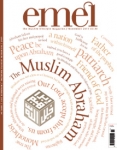
Ancient Role Models
Issue 86 November 2011
As the festival of Eid passes and Christmas draws upon us, we should all strive and work for mutual harmony.
The festive season is upon us. Eid al-Adha has just passed. In a few weeks Christmas celebrations will be underway. These are two huge religious events that between them are celebrated by over half the world’s population.
For the last few years the two occasions have fallen in close proximity to each other. Christmas—whether marked on December 25th or January 6th—is in celebration of the birth of Jesus. Eid al-Adha remembers the sacrifice that Abraham was willing to make of his son Ishmael, at the command of God, and how a sheep was slaughtered in his place.
Although these two occasions might seem quite disparate, there is much that we can do to draw Muslims and Christians together at this time. At the very least, it is an opportunity to learn about the importance of both Jesus and Abraham in both traditions and grow closer through our shared love for both of them.
Although there have been some attempts to connect religious celebrations together, precious little at a very high level has happened to highlight some of the shared themes.
Why bother, you may wonder. As a Muslim, I will be celebrating Eid, but I will be in the thick of the Christmas celebrations of my neighbours and colleagues. So, de facto, it is worth making the most of the opportunity to connect. But, is there really anything to share?
Hajj is of course a once-in-a-lifetime journey that requires one to travel to the sacred places. Its goal is spiritual, but through the physical. It involves many elements such as the travel to Mount Arafah to ask for God’s forgiveness as though one were on the plains of the Day of Judgement; the stoning of the devils to represent the destruction of the inner idols; the wearing of the ihram to represent the human being stripped to its core and equalised with its peers. The central figure for the Hajj is of course Abraham.
Abraham figures prominently in Christianity, Judaism and Islam. His uprightness, mentioned in the Qur’an as his quality of being a ‘hanif’ suggests that he was outstanding in these attributes, and no doubt this leads him to lie at the core of the eponymous Abrahamic religions. If Muslims are going to celebrate and reach out to those of their shared heritage, then what better way to do so then at the festival which marks his contribution.
In the story of Abraham, the Hajj, and the story of Jesus, there are universal themes: of sacrifice, of challenging society’s received notions, of dedication in the face of temptation. We are passing through a time when global society is asking itself fundamental questions about whether the structures and systems embodied in our consumerist capitalist framework really can offer human beings the material and spiritual fulfilment for which they yearn. Both Jesus and Abraham offer us role models of individuals who refused to accept the status quo and were willing to challenge those in power.
These two occasions are not just about the male protagonists. Women feature very strongly in the narratives of both Jesus and Abraham. In both traditions, the revered status of Jesus, peace and blessings be upon him, is underlined by the fact that he had only a mother, Mary. And Mary herself is of an exalted status, one of four perfect women within the Islamic tradition. In the story of Abraham, his wives Sarah and Hajar are also held in the highest regard. Sarah is the blessed wife and mother of prophets. Hajar’s footsteps are repeated by millions upon millions of pilgrims during Hajj and Um’rah when they carry out the action of sa’ee (walking between mounts Safa and Marwa).
For each individual, different element of the stories of Eid al-Adha and Christmas will resonate with them. The point is that each story echoes the other, and in these shared themes we can find ways to connect. Let us share together in the season of goodwill and sacrifice.
Shelina is the author of Love in a Headscarf, and writes a blog at www.spirit21.co.uk
Bookmark this |
|
Add to DIGG |
|
Add to del.icio.us |
|
Stumble this |
|
Share on Facebook |
|
Share this |
|
Send to a Friend |
|
Link to this |
|
Printer Friendly |
|
Print in plain text |
|


Comments
0 Comments